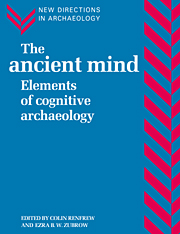Book contents
- Frontmatter
- Contents
- List of figures
- List of tables
- List of contributors
- Preface
- PART I INTRODUCTION
- PART II THE INTERDISCIPLINARY UNDERPINNING
- 2 Interpretation and testability in theories about prehistoric thinking
- 3 Archaeology and cognitive science
- 4 From domain specific to generalized intelligence: a cognitive interpretation of the Middle/Upper Palaeolithic transition
- 5 Are images animated? The psychology of statues in Ancient Greece
- PART III APPROACHES TO CULT PRACTICE AND TRANSCENDENTAL BELIEF SYSTEMS
- PART IV PREHISTORIC CONCEPTIONS OF SPACE AND TIME
- PART V THE MATERIAL BASIS OF COGNITIVE INFERENCE: TECHNOLOGY
- PART VI THE MATERIAL BASIS OF COGNITIVE INFERENCE: WRITING SYSTEMS
- PART VII CONCLUSION
- Index
4 - From domain specific to generalized intelligence: a cognitive interpretation of the Middle/Upper Palaeolithic transition
Published online by Cambridge University Press: 03 December 2009
- Frontmatter
- Contents
- List of figures
- List of tables
- List of contributors
- Preface
- PART I INTRODUCTION
- PART II THE INTERDISCIPLINARY UNDERPINNING
- 2 Interpretation and testability in theories about prehistoric thinking
- 3 Archaeology and cognitive science
- 4 From domain specific to generalized intelligence: a cognitive interpretation of the Middle/Upper Palaeolithic transition
- 5 Are images animated? The psychology of statues in Ancient Greece
- PART III APPROACHES TO CULT PRACTICE AND TRANSCENDENTAL BELIEF SYSTEMS
- PART IV PREHISTORIC CONCEPTIONS OF SPACE AND TIME
- PART V THE MATERIAL BASIS OF COGNITIVE INFERENCE: TECHNOLOGY
- PART VI THE MATERIAL BASIS OF COGNITIVE INFERENCE: WRITING SYSTEMS
- PART VII CONCLUSION
- Index
Summary
Introduction
One of the tasks facing cognitive archaeology is to contribute towards an understanding of the nature and evolution of the human mind. We need to make explicit reference to past cognition when interpreting the archaeological record and to draw inferences from that data concerning ancient minds. Did, for instance, Homo habilis have language, Homo erectus self-awareness or Neanderthals the capacity for analogical reasoning? While fossil endocasts may inform about brain structure, the character of past cognition must be largely inferred from the archaeological record. And to draw such inferences archaeologists need to engage with, or rather become participants in, the cognitive sciences - just as Bloch (1991) has recently argued for anthropology. This is essential since we cannot pretend to understand the ancient mind without entering debates concerning the character of the modern mind.
In this paper I focus on one of these debates, that concerning whether the mind is a general purpose learning mechanism or composed of a series of relatively independent mental modules - psychological mechanisms dedicated to specific tasks or behavioural domains. My review of this debate suggests that a major feature of human cognitive evolution has been increased accessibility between mental modules resulting in a generalized intelligence, though one remaining within a modular architecture. I consider whether the Middle/Upper Palaeolithic transition may have constituted a phase in human evolution during which there was a significant development from domain specific to generalized intelligence.
- Type
- Chapter
- Information
- The Ancient MindElements of Cognitive Archaeology, pp. 29 - 39Publisher: Cambridge University PressPrint publication year: 1994
- 20
- Cited by



